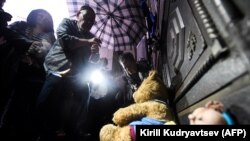Russian court: 'Liking' a social-media post doesn't necessarily mean extremism
| Publisher | Radio Free Europe/Radio Liberty |
| Publication Date | 20 September 2018 |
| Cite as | Radio Free Europe/Radio Liberty, Russian court: 'Liking' a social-media post doesn't necessarily mean extremism, 20 September 2018, available at: https://www.refworld.org/docid/5bc053cca.html [accessed 1 June 2023] |
| Disclaimer | This is not a UNHCR publication. UNHCR is not responsible for, nor does it necessarily endorse, its content. Any views expressed are solely those of the author or publisher and do not necessarily reflect those of UNHCR, the United Nations or its Member States. |
September 20, 2018 16:33 GMT
By RFE/RL's Russian Service
 People place stuffed toys in front of the Russian Supreme Court during a rally to demand the release of two teenagers accused of "extremism" in a case they say is part of a growing Kremlin crackdown on Russian youth, in Moscow on August 15.
People place stuffed toys in front of the Russian Supreme Court during a rally to demand the release of two teenagers accused of "extremism" in a case they say is part of a growing Kremlin crackdown on Russian youth, in Moscow on August 15.
Russia's Supreme Court has sharply narrowed when people can be charged under the country's extremism laws, saying that simply "liking" or reposting material on social media does not alone constitute a crime.
The September 20 ruling follows a string of recent cases in which Russians have been charged for publishing materials, sometimes satirical, to social-media platforms such as VKontakte and Facebook.
Kremlin critics say that the cases are part of an ongoing government crackdown on online speech and that the authorities have used extremism laws to stifle dissent.
Vladimir Davydov, a deputy chairman of the court, told reporters on September 20 that merely reposting material on social media doesn't automatically mean it's a crime.
Authorities must prove there was intent to foment hatred or ethnic hostility, he said.
"Judges…should check not the actual fact of publication, not the 'repost,' not the 'like,' but they should check the actual motives," he said.
He said the court would also review earlier convictions on extremism-related charges.
A growing number of Russians have been caught up by authorities' strict – and some say overly broad --interpretation of the country's extremism laws.
Last year, a 27-year-old man in the city of Cheboksary was found guilty of "mass distribution of extremist materials" when he reposted a news item about his earlier conviction for reposting "extremist" content.
Authorities have also taken a dim view of satirical material and online publications, such as Internet memes, that poke fun at religious figures and beliefs.
In August, a 38-year-old man in the city of Barnaul was charged for a social-media posting that lampooned the head of the Russian Orthodox Church for wearing a pricey wristwatch.
With reporting by Current Time TV
Link to original story on RFE/RL website
